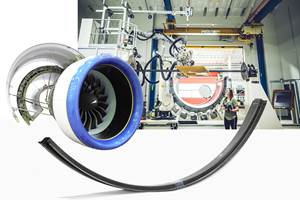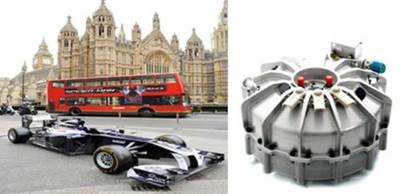ADL to purchase GKN carbon fiber Hybrid Power flywheels
Scotland-based bus and coach manufacturer ADL will purchase 250 GKN Hybrid Power flywheels for energy storage and discharge.
Alexander Dennis Limited (ADL, Edinburgh, UK) – Britain’s largest bus and coach manufacturer – has chosen GKN Hybrid Power (Oxfordshire, UK) as a preferred partner and committed to purchase 250 of its Gyrodrive electric flywheel systems. ADL will focus initially on the introduction of the low emission technology to bus fleets in London and Oxford but anticipates rapid deployment across the UK in the next few years. It will also be working closely with GKN to develop the technology for international markets.
The Gyrodrive system uses a high speed flywheel made of carbon fiber to store the energy generated by a bus as it slows down to stop. It then utilizes the stored energy to power a GKN EVO electric motor which helps accelerate the bus back up to speed, generating significant fuel savings at a considerably lower cost than battery hybrid alternatives.
ADL’s Euro6 Enviro400 bus — the UK’s best-selling double deck bus — fitted with the Gyrodrive system recently achieved Low Carbon Emission Bus Certification, which acknowledges a 30% reduction in greenhouse gas emissions and entitles operators to enhanced fuel rebates.
The Gyrodrive system is designed to last for the life of the bus eliminating the need for any battery changes and offering much lower whole-life costs than other hybrid alternatives, making it a truly viable system commercially.
Based on Formula One race technology developed in the UK, the innovative GKN system will help increase the efficiency of every bus to which it is fitted by using less fuel and therefore reducing carbon emissions. This same technology helped Audi’s R18 e-tron win at Le Mans in June, Audi’s third consecutive win with GKN’s carbon fiber flywheel.
Earlier this year transport operator Go-Ahead Group selected GKN to supply 500 systems for use on buses in cities across the UK following successful trials in London.
Philip Swash, CEO GKN Land Systems, said: ‘We are delighted to have been chosen by ADL as its preferred supplier of this technology and are committed to developing a long term relationship aimed at improving the efficiency of public transport.
“This technology presents huge opportunities internationally and we are excited to be working with ADL, a company that has increased its global footprint enormously in the last decade.”
CEO of Alexander Dennis, Colin Robertson, commented: “ADL is now well established as Britain’s leading provider of advanced hybrid systems with almost 800 of our low carbon buses operating across the country. This alliance with GKN introduces a new dynamic to the market place, courtesy of a lower cost solution that provides significant fuel and greenhouse gas reductions, coupled with reliability and durability. Add to this the incomparable aftermarket support that we can provide together and it represents a powerful proposition.”
GKN Hybrid Power is based in Oxfordshire, with final assembly taking place in a new facility at GKN’s site in Telford. The Gyrodrive technology is being further developed for other mass transit markets including trams, construction and agricultural equipment. Earlier this year GKN announced the acquisition of Williams Hybrid Power from Williams Grand Prix Engineering Limited to form GKN Hybrid Power, which is focused on delivering complete hybrid solutions across multiple vehicle, power and industrial markets.
Related Content
The potential for thermoplastic composite nacelles
Collins Aerospace draws on global team, decades of experience to demonstrate large, curved AFP and welded structures for the next generation of aircraft.
Read MoreComposites end markets: New space (2025)
Composite materials — with their unmatched strength-to-weight ratio, durability in extreme environments and design versatility — are at the heart of innovations in satellites, propulsion systems and lunar exploration vehicles, propelling the space economy toward a $1.8 trillion future.
Read MorePlant tour: Airbus, Illescas, Spain
Airbus’ Illescas facility, featuring highly automated composites processes for the A350 lower wing cover and one-piece Section 19 fuselage barrels, works toward production ramp-ups and next-generation aircraft.
Read MoreRevisiting the OceanGate Titan disaster
A year has passed since the tragic loss of the Titan submersible that claimed the lives of five people. What lessons have been learned from the disaster?
Read MoreRead Next
Composite flywheels: Finally picking up speed?
A wave of new composite flywheel developments for bus, rail, auto, heavy truck, construction equipment, and power grid support promises fuel savings, improved efficiency and reduced emissions — i.e. sustainability in the global quest for more energy.
Read MoreCeramic matrix composites: Faster, cheaper, higher temperature
New players proliferate, increasing CMC materials and manufacturing capacity, novel processes and automation to meet demand for higher part volumes and performance.
Read MoreCutting 100 pounds, certification time for the X-59 nose cone
Swift Engineering used HyperX software to remove 100 pounds from 38-foot graphite/epoxy cored nose cone for X-59 supersonic aircraft.
Read More











